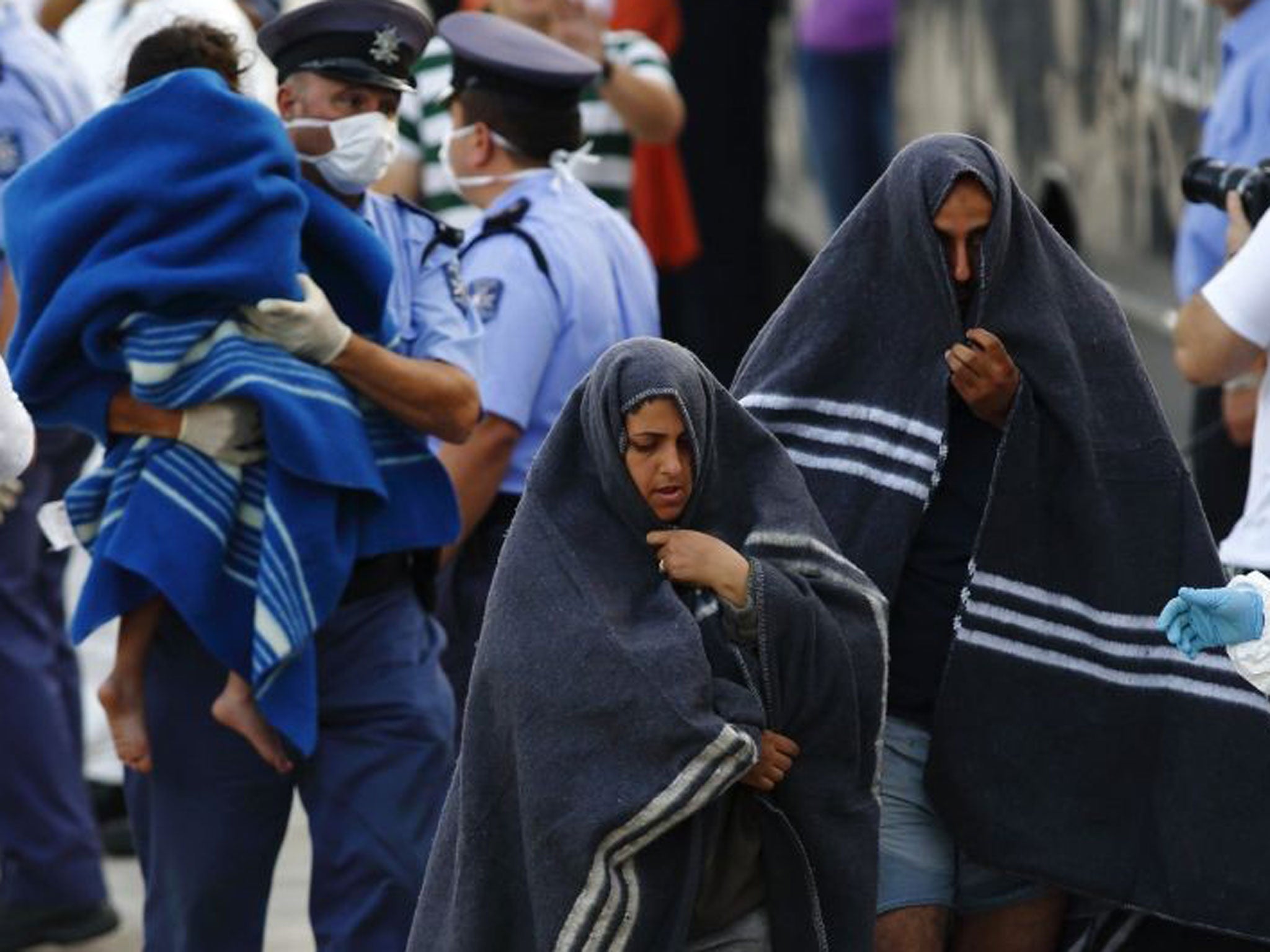Another week, another boat disaster: Does no one know how to stem human tide that is turning the Mediterranean into 'a migrants' cemetery'?
Whether or not they knew of the earlier disaster, more desperate migrants risked their lives to reach Europe on Friday, and at least 34 died

In the days that followed the deaths at sea of more than 359 Somalia and Eritrean migrants, Europe was united in shock and outrage. The mayor of the Italian island of Lampedusa wept over the coffins lining the beach. Jeering protesters screamed "Disgrace!" at the European Commission and Italian presidents. The continent's leaders agreed that more must be done.
Then, just over a week later, in the same stretch of Mediterranean separating Africa and Europe, 250 more migrants squeezed into a packed boat. That vessel too capsized late on Friday, plunging the men, women and children into choppy seas. By yesterday, 34 people, among them three children, were confirmed dead, as the Italian and Maltese coastguard searched for more bodies in waters that were fast becoming "a cemetery", the Maltese Prime Minister, Joseph Muscat, said.
It seems inconceivable that the men and women who set sail did not know what had happened to other migrants a week before. But such is their desperation to flee poverty, war and persecution, the risk of dying seems worth taking.
"They do know that they are risking their lives," Maurizio Albahari, assistant professor of anthropology at the University of Notre Dame, in Indiana, USA told the Associated Press. "But it is a rational decision, because they know for a fact they will be facing death or persecution at home."
It is a precarious odyssey played out all over the world, sometimes by people trying to seek work in a more prosperous place to provide for families back home. Many others are fleeing political persecution and conflict: those killed last week were mostly from Syria, where a civil war has left 100,000 people dead and created more than 2 million refugees.
Migrants from South and Central America risk death at the hands of Mexico's drug gangs or in the deserts along the US border. The boats that carry South Asians to Australia are little better than the crafts crossing the Mediterranean, frequently crashing into the rocks. But terms such as "asylum-seekers" and "immigrants" elicit little sympathy in most developed nations, meaning governments simply beef up their borders, thereby sending the migrants on ever more precarious voyages.
Across Europe, support for anti-immigration parties is rising, as the economic crisis causes soaring unemployment and cuts to social welfare. In the worst hit countries such as Greece and Cyprus, migrants and refugees have been harassed, attacked and beaten. While the 3 October disaster on Lampedusa provoked "a lot of hand-wringing, a lot of soul-searching, a lot of debate", the Human Rights Watch researcher Judith Sunderland said that policies that make a difference are the most politically sensitive.
"A lot more has to be done to address both the risks of the journey across the Mediterranean and more broadly why those people undertake those risks, and that is a much broader policy discussion about how to facilitate more legal migration," she told The Independent on Sunday.
European Union officials have been calling on the wealthier nations to share the burden and accept more refugees from poorer nations on the fringes of the bloc. Such a gesture, the EU Home Affairs Commissioner Cecilia Malmström has said, would offer a legitimate route for people seeking asylum, and help prevent desperate journeys at sea.
But since the Lampedusa tragedy, no European nation has volunteered. A European Commission spokesperson said it was "far too early" to draw conclusions on how member states would react, adding the matter would be discussed at a meeting of EU heads of state from 24 October.
Jose Manuel Barroso, President of the European Commission, has pledged €30m (£26m) to help Italy deal with the migrants, while Ms Malmström has also called for an expanded operation by the EU's border agency, Frontex, which would deploy search and rescue craft across the Mediterranean.
More than 6,450 people have died trying to cross from Libya to Malta and Italy since 1994, Italian charities say. People also perish trying to reach Spain or the Greek islands. Thousands more suffer daily hardship on their quests across Africa, Asia, the Middle East and Latin America.
It is usually only when a tragedy strikes that the world hears about these journeys. In October 2001, 146 children were among the 353 Iraqi and Afghan migrants killed in a shipwreck off the coast of Indonesia. On the US border, 477 people died last year, the highest number in seven years. Many hundreds more die crossing Central America. In 2010, a grave of 71 migrants was discovered in Mexico. They were kidnapped and killed by the Zetas drugs gang because they refused to work as mules for the cartel.
But while war and poverty remain around the world, people will try to flee. The numbers trying to enter Europe this year are already close to the record highs reported during the Arab Spring. Frontex says 31,000 people have been detected entering Europe through Malta and Italy so far this year, already double the 15,000 who entered in 2012.
"How many more people have to die before action is taken?" Mr Muscat asked on Friday. "Malta and Italy are working together and we feel abandoned on this operation. This is a European problem. These desperate people are looking for a future in Europe, and Europe cannot go blind. The seas around us have turned into a cemetery."
Join our commenting forum
Join thought-provoking conversations, follow other Independent readers and see their replies
Comments